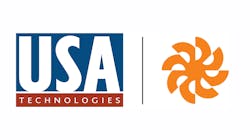Acceleration of Contactless Trends to Grow 8X from Non-Contactless Payments, USAT Study Finds
USA Technologies surveyed 474 businesses — including 336 vending operators — to assess the COVID-19's effects on the industry and key trends emerging from the pandemic. A video accompanying this release may be viewed here.
September 09, 2020 11:00 AM Eastern Daylight Time
MALVERN, Pa.--(BUSINESS WIRE)--COVID-19 has disrupted many industries in varying degrees and has impacted the way consumers buy goods and services. USA Technologies, Inc. (OTC:USAT) (“USAT” or the “Company”) recently surveyed 474 businesses, including 336 vending operators, during the peak of the pandemic in early May when most states were in closed phases. The results enabled the Company to gauge the pandemic’s effects on the unattended retail market.
USAT was able to get a close look at a few key trends that have emerged amongst consumers. Specifically, the survey data noted shifts in payment method and changes to products and services offered as a result of changing consumer demands. We found 27% of the operators pivoted to offering new products and services, including PPE products, and 19% were offering boxed lunches and take-out options, for example.
The data appears in a new infographic from USAT, which depicted the data analyzed from 120,000 cashless terminals in order to compare the survey results against unattended retail terminal performance. From the survey conducted in early May, 66% of respondents reported seeing more than 50% of their revenue impacted during the peak of COVID-19, with 48% of total respondents identifying that they were located in a COVID-19 hot spot (e.g. a city or location like New York City or Chicago). During the month of April USAT observed the largest decline in average sales per machine. By May, the market showed signs of recovery, being driven by cashless payments, specifically contactless payments. The cashless terminals analyzed saw a 51% growth in sales per machine overall, with 61.7% of total sales in July 2020 made with cashless payments, vs 53.1% in January. The accelerated adoption of cashless has spurred many in the industry not currently offering a cashless alternative to implement this payment method into their business model. Cashless payments are an attractive alternative, as a matter of health and safety, security, as well as a noted 43% increase in average transaction size.
“The trends towards cashless, specifically contactless, are being driven by consumers looking for more secure and better protected ways to pay for goods and services,” said Elyssa Steiner, vice president of Marketing, USA Technologies. “The adoption of contactless payments has been growing steadily over the past few years. However, the onset of COVID-19 certainly has accelerated the demand and use. We believe that this movement towards digital payments of any form, whether credit card, mobile wallet, or such will continue to propagate, as businesses look to provide a safer way to pay for products in person.”
You can download the infographic here.
Sales and Partnership Inquiries:Please contact USA Technologies, Inc. at +1 800.633.0340 or [email protected]
About USA Technologies, Inc.USA Technologies, Inc. is a cashless payments and software services company that provides end-to-end technology solutions for the self-service retail market. USAT is transforming the unattended retail community by offering one integrated solution for payments processing, logistics, and back-office management. The company’s enterprise-wide platform is designed to increase consumer engagement and sales revenue through digital payments, digital advertising and customer loyalty programs, while providing retailers with control and visibility over their operations and inventory. As a result, customers ranging from vending machine companies, to operators of micro-markets, gas and car charging stations, laundromats, metered parking terminals, kiosks, amusements and more, can run their businesses more proactively, predictably, and competitively.
Forward-Looking StatementsAll statements other than statements of historical fact included in this release, including without limitation the business strategy and the plans and objectives of USAT's management for future operations, are forward-looking statements within the meaning of the Private Securities Litigation Reform Act of 1995. When used in this release, words such as “may,” “could,” “expect,” “intend,” “plan,” “seek,” “anticipate,” “believe,” “estimate,” “predict,” “potential,” “continue,” “likely,” “will,” “would” and variations of these terms and similar expressions, or the negative of these terms or similar expressions, as they relate to USAT or its management, may identify forward-looking statements. Such forward-looking statements are based on the reasonable beliefs of USAT's management, as well as assumptions made by and information currently available to USAT's management. Actual results could differ materially from those contemplated by the forward-looking statements as a result of certain factors, including but not limited to the incurrence by USAT of any unanticipated or unusual non-operational expenses which would require us to divert our cash resources from achieving our business plan; the uncertainties associated with COVID-19, including its possible effects on USAT’s operations and the demand for USAT’s products and services; the ability of USAT to retain key customers from whom a significant portion of its revenues is derived; the ability of USAT to compete with its competitors to obtain market share; whether USAT's existing or anticipated customers purchase, rent or utilize ePort or Seed devices or our other products or services in the future at levels currently anticipated by USAT; or other risks discussed in USAT’s filings with the U.S. Securities and Exchange Commission. Readers are cautioned not to place undue reliance on these forward-looking statements. Any forward-looking statement made by us in this release speaks only as of the date of this release. Unless required by law, USAT does not undertake to release publicly any revisions to these forward-looking statements to reflect future events or circumstances or to reflect the occurrence of unanticipated events. If USAT updates one or more forward-looking statements, no inference should be drawn that USAT will make additional updates with respect to those or other forward-looking statements.
-- G-USAT
